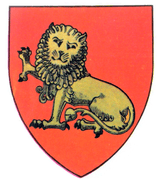Tighina County
| Județul Tighina | ||
|---|---|---|
| County (Județ) | ||
| ||
 | ||
| Country |
| |
| Historic region | Bessarabia | |
| Capital city (Reședință de județ) | Tighina | |
| Established | 1925 | |
| Ceased to exist | Administrative and Constitutional Reform in 1938 | |
| Area | ||
| • Total | 6,333 km2 (2,445 sq mi) | |
| Population (1930) | ||
| • Total | 307,629 | |
| Time zone | EET (UTC+2) | |
| • Summer (DST) | EEST (UTC+3) | |
| Tighina County | |
|---|---|
| County | |
| Country | Moldova |
| established | 1998 |
Tighina County was between 1925 and 1938 a county (Romanian: județ) in the Kingdom of Romania, and, between 1998 and 2003, a major subdivision (Județ) of Moldova with its capital at Căușeni.
Interwar county
Neighbours
The county neighboured the Soviet Union to the east, the counties of Lăpușna to the north, Cahul to the west and Cetatea Albă to the south.
Administration
The county consisted of four districts (plăși):
After 1938
After the 1938 Administrative and Constitutional Reform, this county merged with the counties of Lăpușna, Cetatea Albă and Orhei to form Ținutul Nistru.
County in Moldova
It bordered Ukraine, Transnistria, Lăpușna County and Chișinău County.
Major cities in the county included Bender, Cainari, Căușeni, Olănești, and Ștefan Vodă.
Currently, the city Bender and six villages are in the neutral zone under the authority of the Joint Control Commission, but are administered by authorities subordinated to the breakaway territory of Transnistria.
External links
| Wikimedia Commons has media related to Interwar Tighina County. |
- (Romanian) Tighina County on memoria.ro

